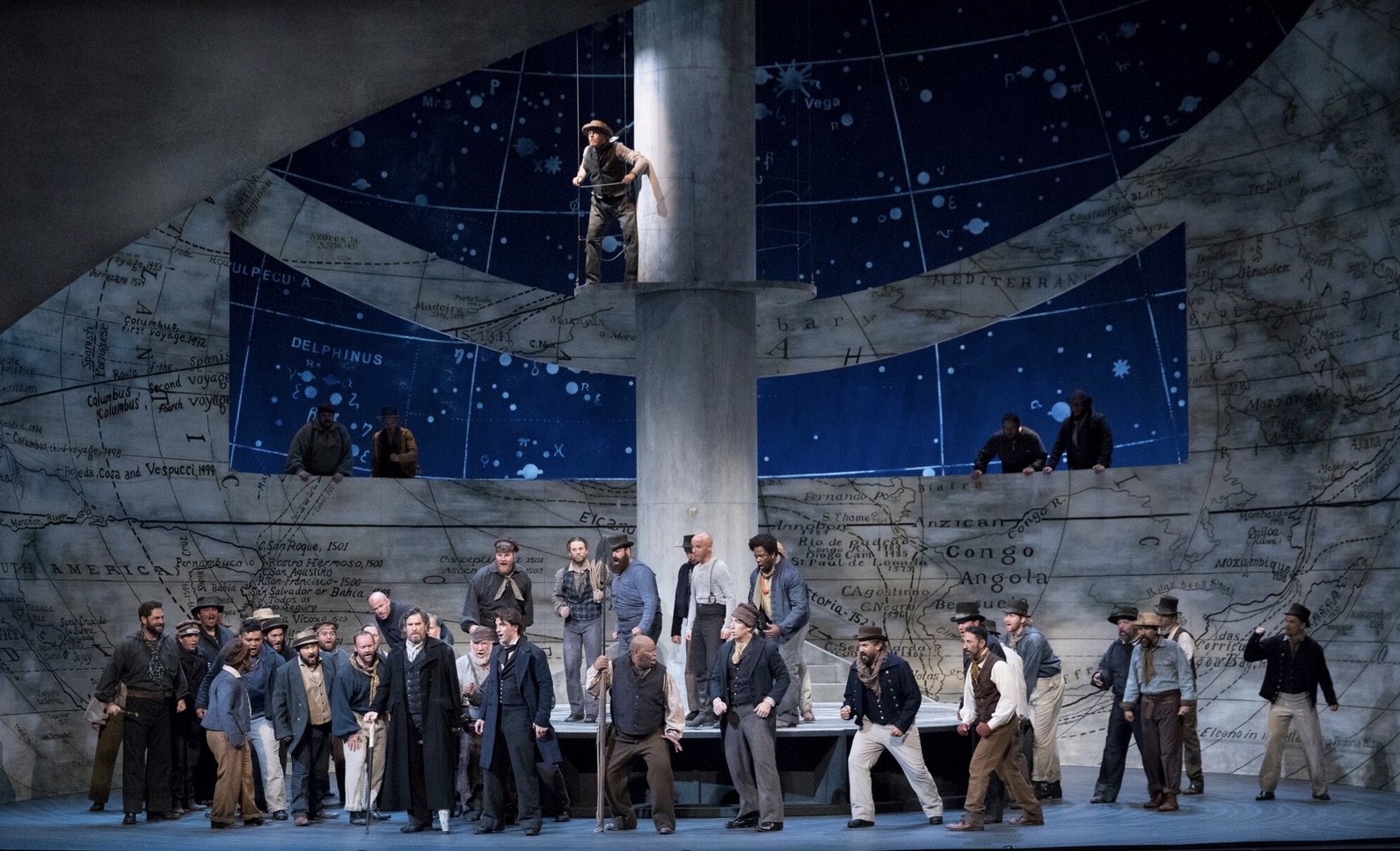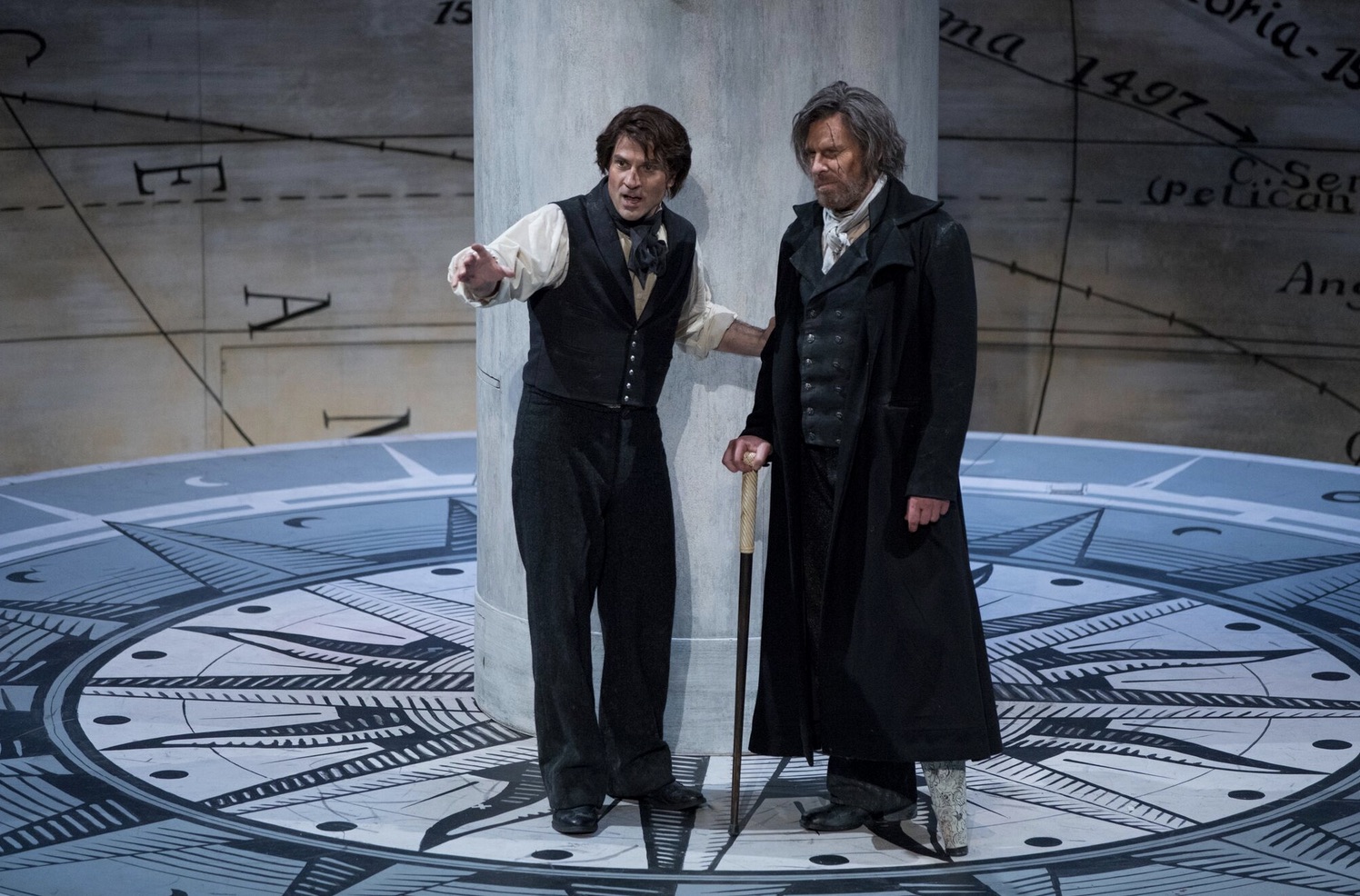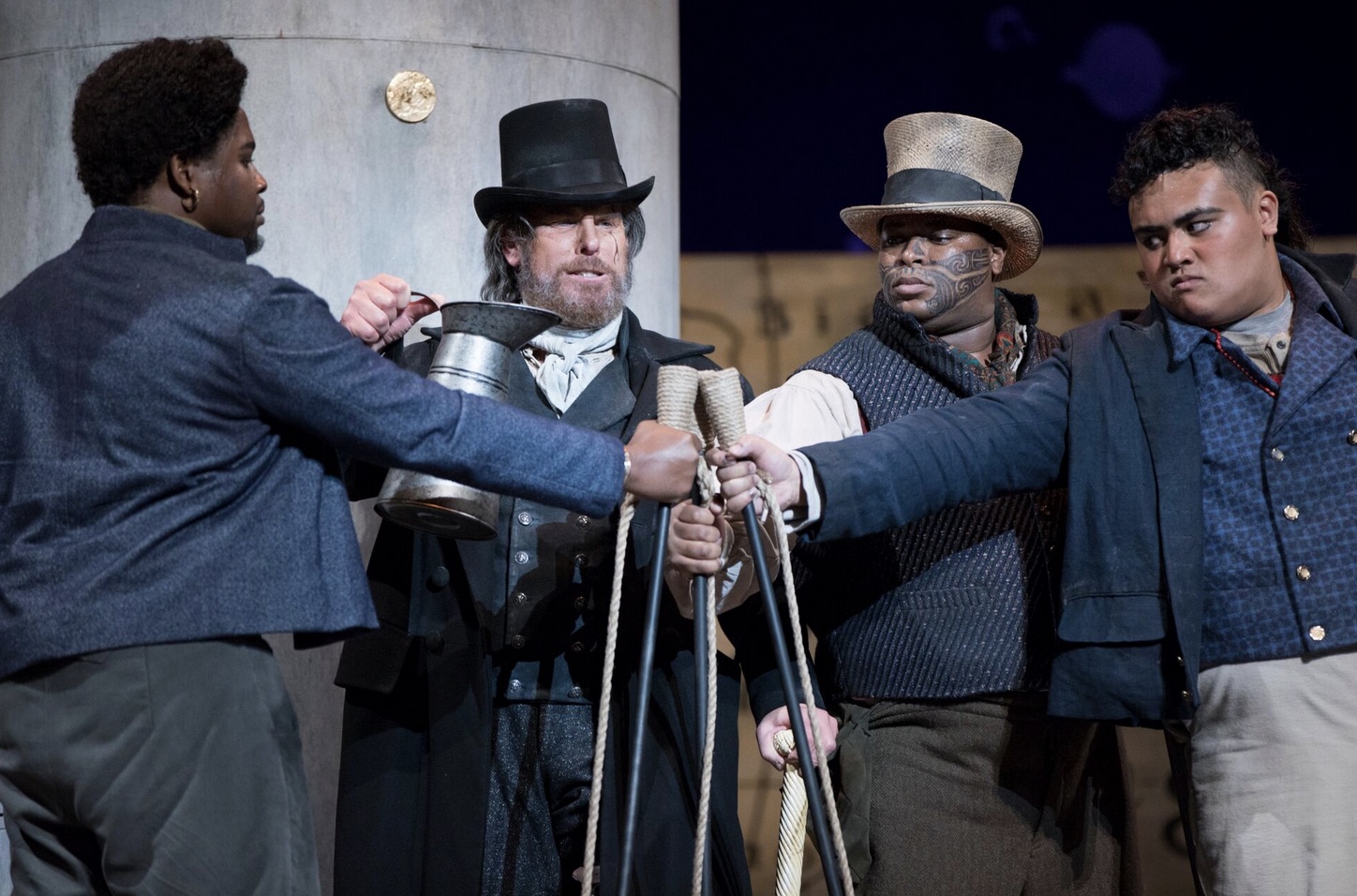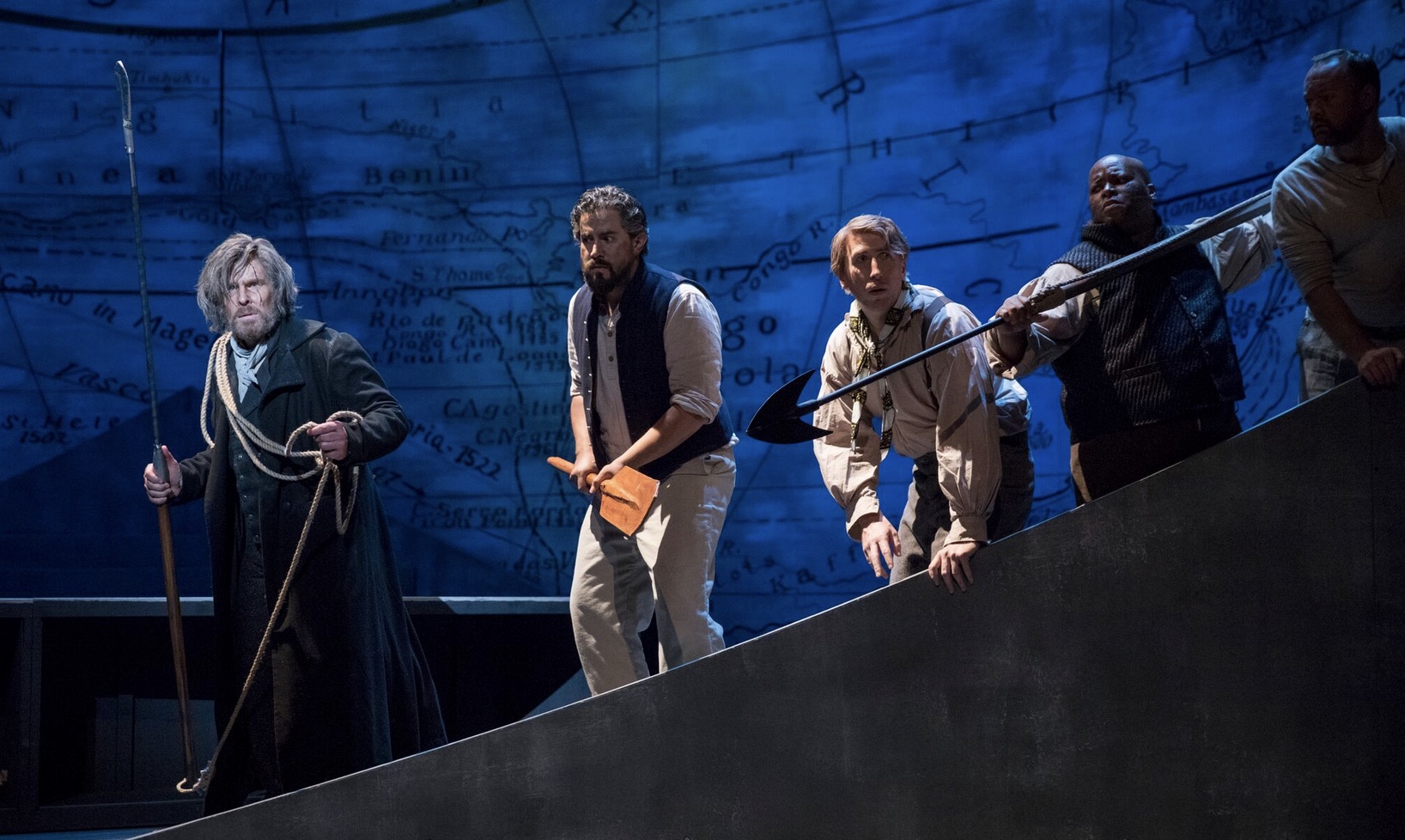Janet Quinney Lawson Capitol Theatre, Salt Lake City
January 20, 2018
Well received contemporary operas are not as rare as the naysayers like to tell us – in recent memory Thomas Adès’ The Exterminating Angel, George Benjamin’s Written On Skin and Liza Lim’s Tree of Codes all went down well with audiences and critics alike – but getting a second staging often proves a bigger ask. This was particularly true in the case of Jake Heggie and Gene Sheer’s ambitious and applauded adaptation of Herman Melville’s Moby Dick, which made a colossal splash at Dallas Opera in 2010. In its singular, state-of-the-art staging the work received its Australian premiere in 2011 at State Opera of South Australia (one of the original co-commissioners and producers), but there matters stalled.
 Utah Opera Company in Moby Dick © Dana Sohm
Utah Opera Company in Moby Dick © Dana Sohm
Companies, it seems, were lining up to put it on, but one by one they fell away, daunted by the price tag required to launch this high-tech operatic behemoth on world stages. Moby Dick appeared destined to be cast adrift on the endless sea of operatic memory – until now. Enter Utah Opera, in this its 40th year, whose pioneering efforts have produced a simplified version that is not just available, it’s clearly downright viable as demonstrated by Kristine McIntyre’s modest yet intense new production.
Of course, none of this would matter if Heggie and Sheer hadn’t created something lasting and worthwhile out of Melville’s sprawling novel of fixation, revenge and whalers on the high seas in search of blood and profit. But from the atmospheric seascape of the ‘overture’ onwards – its theme later identifiable with Ahab’s obsession – the power of score and story are undeniably compelling. Across two substantial acts, the 75-strong Utah Symphony under Joseph Mechavich do a superb job of bringing these resourceful scorings to life, playing with grace and strength in equal measure.
Once again, Heggie demonstrates why he’s one of today’s go-to composers for thoughtful, yet accessible music theatre. His imaginative score glitters with an impressionistic sheen, its motor rhythms paying a minor debt to minimalism. His intricate, effective, melismatic (when it pays to be), and most of all singable vocal lines owes something perhaps to Britten, but he’s very much his own man, a singer’s composer par excellence who always puts comprehensibility ahead of demanding effect. Memorable, yet never cheesy, his frequently catchy motifs are subtly deployed, drafting their own inner storyline even as Sheer’s economic, punchy and poetic libretto tells the more direct tale.
 David Adam Moore as Starbuck and Roger Honeywell as Ahab © Dana Sohm
David Adam Moore as Starbuck and Roger Honeywell as Ahab © Dana Sohm
If it seems odd to single out arias and choruses in a contemporary opera where such blatant shibboleths are generally eschewed, that is another of Heggie’s strengths. His choruses, lusty yet complex, bear comparison with that other shipboard take on Melville, Billy Budd, and the 31-strong men of the Utah Opera chorus do it proud, singing with power and precision, despite having some complex hand and footwork to deliver thanks to Daniel Charon’s smartly conceived and mostly unobtrusive choreography. The ultimately disastrous mob mentality and tribalism of the cooped-up mariner comes over in testosterone-charged set pieces of considerable potency.
But if Moby Dick is an opera worth the doing, Heggie and Sheer’s deftly boiled down take on the original epic is no pussycat to put on stage. There are harpoon chases, men overboard and a nasty case of St Elmo’s fire to deal with, not to mention the chilling appearance of the baleful “white-headed whale with a wrinkled brow and a crooked jaw”, the twisted harpoons still peppering his flanks. Most, if not all of the above is tackled with aplomb by McIntyre through the agency of Erhard Rom’s clean-limbed sets, Marcus Dilliard’s sensitive lighting and Jessica Jahn’s carefully observed period costumes.
The curved performance space is molded appropriately like a Greek amphitheatre and Rom’s build has the added bonus of pinging the voices forward into the auditorium. The lower section is painted like a sailor’s map of the earth, while the area above alternates between a similarly graphic astronomical chart and projections of clouds. Windows can open or close, especially effective when creating the illusion of a rowboat full of whalers. The whole is rooted around a central mast with a revolving central dais that can pivot to offer an illusory prow. Done at speed, it lends a clever rush of adrenalin to the moment when a harpooned whale suddenly takes off at full pelt. Exquisitely painted, from the front on it’s an attractive conceit, even if from certain angles there’s something a little cardboard cut-out about it all.
 Babatunde Akinboboye as Daggoo, Roger Honeywell as Ahab, Musa Ngqungwana as Queequeg and Keanu Aiono-Netzler as Tashtego © Dana Sohm
Babatunde Akinboboye as Daggoo, Roger Honeywell as Ahab, Musa Ngqungwana as Queequeg and Keanu Aiono-Netzler as Tashtego © Dana Sohm
McIntyre moves her players effectively around the space, adroitly solving many of the transitional problems. The feeling of claustrophobia can work to McIntyre’s advantage too, as when the gruesome rendering of whale blubber is forced to rub up against a sublimely peaceful trio. It’s not all perfect – the St Elmo’s fire effect is pretty tame and the front cloth drop to cover the loss of all hands feels a cop out – but the crow’s nest works well, the reveal of Moby Dick stays the right side of silly, and thanks to convincing acting from all concerned much of the rest comes off with credit.
Heading the all-male bar one cast is Roger Honeywell in the heldentenor role of Ahab, a part originally written for Ben Heppner. A fine actor, he captures the grim flintiness of the “stricken, blasted and crazed” captain, even if we wait a long time to glimpse any of his vaunted “goodness”. Most importantly, he finesses the fanatical side without being tempted to go over the top, even when turning for aid to the devil himself. His steely voice is powerful and always carries, though he’s a little tight of tone at the very top and had some (admittedly not-uncharacterful) gruff moments. Ahab has a series of showcase arias – Light, thou leapest out of darkness has a Lear-like intensity – as well as duets and ensembles, and Honeywell is always in the moment, his musical intelligence penetrating text that can be peppered with knotty ‘Melvillisms’.
Complementing the fire and fury of Ahab is David Adam Moore’s pale, practical, deeply human Starbuck. Singing with enviable projection and a rich tone, his striking baritone offers equal parts pater familias and Christian zealot put on earth to root out blasphemy. In some ways as implacable as his master, Starbuck sees only dumb instinct in the whale where Ahab senses inscrutable malice. If his opposition is drawn a little starkly early on, the poignant conjunction of these two immovable objects in the opera’s most ecstatic duet just before the final sighting of Moby Dick is beautifully written and equally well played.
 Roger Honeywell as Ahab, Craig Irvin as Stubb, Joshua Dennis as Greenhorn and Musa Ngqungwana as Queequeg © Dana Sohm
Roger Honeywell as Ahab, Craig Irvin as Stubb, Joshua Dennis as Greenhorn and Musa Ngqungwana as Queequeg © Dana Sohm
By way of contrast, Joshua Dennis’s Greenhorn – the virgin whaler with November in his soul who discovers a newfound will to live and ends the opera with the immortal “Call me Ishmael” – combines a warm lyrical tenor with a natural innocence, a dose of melancholy and a welcome dash of humour. His developing friendship with Musa Ngqungwana’s gorgeously resonant Queequeg is the opera’s sweet spot and both actors play it to perfection. Dennis’s effortless simplicity is ideal for Grrenhorn’s affecting “Human madness” aria and he brings textual intelligence to tricksy lines like “Lents, prayers and Ramadans have a way of making the world an uncomfortable inn to lodge in” Commanding the stage, Ngqungwana captures the comforting solidity and certainty that sit just beneath the surface of Queequeg’s intriguing exoticism. As they grapple with loneliness and the ineffable call of the Southern Seas, Heggie gives them a series of formidable duets that see tenor and bass blending vocal timbres that are essentially chalk and cheese with impressive acuity.
The only female voice to leaven the choral texture, Jasmine Habersham makes a memorable Pip, her silvery, flexible soprano cutting through three dozen bellowing men. Yet she can be fragile too, and her diction is terrific. Definitely a voice to watch. The rest of the Pequod’s motley crew are strongly cast all round with another fine baritone, Craig Irvin, as the playful Stubb and Joseph Gaines’ laser beam tenor piercing the musical darkness as Flask. Babatunde Akinboboye as Daggoo and Keanu Aiono-Netzler as Tashtego have less to do, but make their mark as finely drawn individuals, while Jesús Vicente Murillo as the luckless Captain Gardiner delivers his lines from the theatre’s balcony with authority.
When the Mormons trundled into the Salt Lake valley back in 1847, the second building that Brigham Young planted in his new city was a theatre. If Utahans have traditionally proved pioneers and artists in equal measure, this fine and timely Moby Dick is just the latest in an honourable line.
Moby Dick plays in Salt Lake City until January 28 before moving to Pittsburgh Opera where ex-Pinchgut AD Antony Walker conducts from March 17 – 25











Comments
Log in to join the conversation.